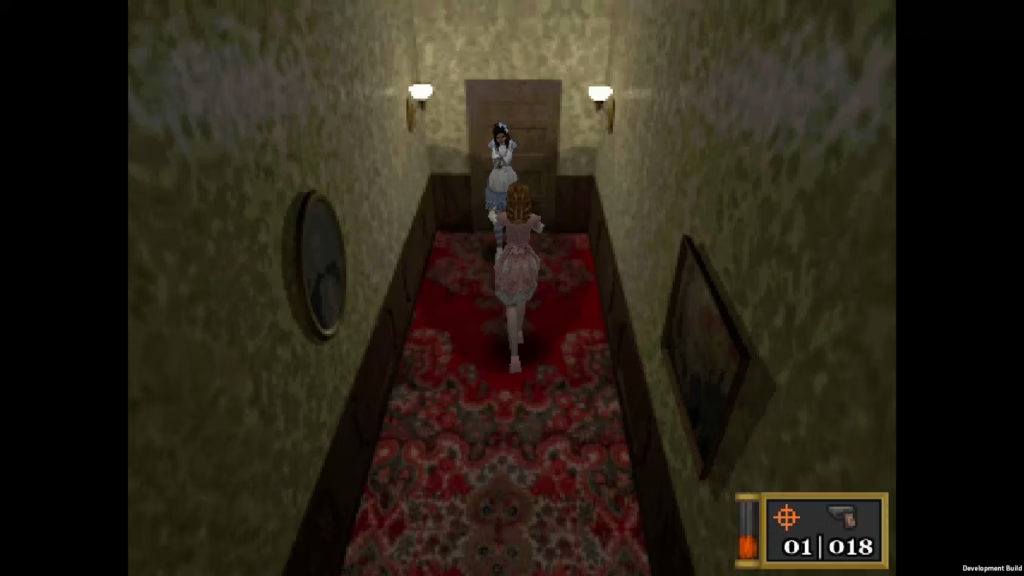
Alisa throws players into a bizarre and nightmarish world that fuses dollhouse aesthetics with classic survival horror gameplay. The story follows Alisa, an elite royal agent who awakens in a strange Victorian inspired mansion after pursuing a fugitive. Stripped of her gear and trapped inside a labyrinth of rooms inhabited by life sized, murderous dolls, she must uncover the truth behind the estate while struggling to survive. The narrative evokes feelings of disorientation and helplessness, blending surreal visuals with the creeping dread of being hunted by things that should not be alive.
Developed and self-published by Belgian indie developer Casper Croes, Alisa was released for PC in September 2021. Built as a love letter to 1990s survival horror, it replicates the feel of PlayStation era classics while delivering its own twisted identity. The game emphasizes fixed camera angles, tank controls, and deliberately clunky combat, all wrapped in a strange, dreamlike setting where mechanical dolls and unsettling characters dominate. Its release was widely noted in the indie horror community for authentically capturing the charm and tension of the genre’s golden age.












Gameplay
At its core, Alisa plays like a faithful recreation of early survival horror mechanics. Exploration unfolds through pre-rendered style environments with fixed perspectives, forcing players to carefully manage positioning and awareness. Combat is deliberate and slow, relying on firearms and melee weapons that feel fragile against the relentless doll like enemies. A slightly unique feature is the in game currency system, where players must purchase outfits, gear, and supplies, often forcing difficult choices that affect survival chances, even if it can be compared to the system with The Merchant in Resident Evil 4 it also introduced a little bit on the souls games mechanics when talking about the dresses and the abilities or advantages that can come with these upgrades, but sometimes in order to gain advantages other stats need to be sacrificed. Limited ammunition, stiff controls, and constant resource management reinforce vulnerability, keeping tension at the forefront.
Visuals & Style
The game’s art direction leans heavily on low-poly, early 3D graphics that deliberately mimic the imperfections of late 1990s PlayStation games. Characters appear uncanny, their stiff animations and distorted designs amplifying the surreal atmosphere. The Victorian mansion mixes elegance with decay, each room designed to feel unsettling yet oddly familiar. The sound design adds to the unease, with mechanical grinding, warped laughter, and chilling silence filling the spaces between encounters. Rather than aiming for realism, Alisa thrives on its unsettling artificiality, turning nostalgia into a tool for horror.
Importance in Survival Horror History
Alisa stands out as one of the most dedicated homages to the origins of survival horror. While many modern indie titles borrow elements of the genre, Casper Croes sought to fully replicate the feel of the classics while expanding upon them with surreal worldbuilding. It’s strange mixture of period-piece aesthetics and doll-inspired horror made it unique in the indie scene, proving that even with limited resources, developers could recreate the spirit of games like Resident Evil and Silent Hill while exploring entirely new themes. This Games marks a Milestone in Survival Horror History contributing to the Retro Horror Revival.
Reception vs Historical Value
Reception to Alisa was positive within its niche, with players praising its authenticity, atmosphere, and dedication to the old school formula. Critics noted that its clunky mechanics and dated feel might deter those not already fond of retro survival horror, but fans of the genre embraced it as one of the strongest indie attempts at recapturing the era. Historically, Alisa is valued as part of the broader retro horror revival, standing alongside other indie projects that remind players of why survival horror thrived in the 1990s, while still carving out its own eerie identity.
Availability & Collectibility

Alisa was first released digitally on PC through Steam and Itch.io. While no console versions were available at launch, the developer has since announced plans to expand to additional platforms. Physical editions remain limited, Premium Games is Pre-Ordering for the Nintendo Switch. As one of the most distinctive indie survival horror games of recent years, its collectibility is tied to its cult reputation, particularly among players who seek modern games that embrace retro authenticity.
Get it on:
Steam:Alisa on Steam
Nintendo: Alisa Developer’s Cut for Nintendo Switch – Nintendo Official Site
Itch.io: Alisa by Casper Croes
Casper Croes and his Legacy
In what it’s marked as the first ever interview provided by Casper Croes With El Joe, Casper went deep into de Development, Inspirations , character Development and Lore behind Alisa and hinted whats next for the Alisa Franchies and for Casper Croes as a Developer.
Watch Interview:
Trailer:
